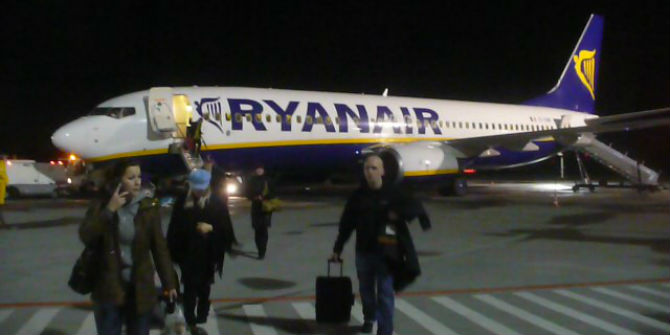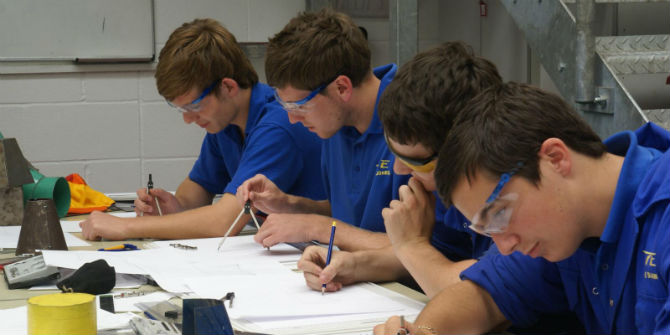 How does it feel to be a Polish national in Scotland after the EU referendum? Kate Botterill (Edinburgh Napier University) discusses how the result and subsequent uncertainty affected them, and the strategies they have adopted to deal with it. Post-Brexit, the Scottish Government want a different approach to migration from the rest of the UK, which may lead to stronger identification with Scotland among many Poles living in the country. Nonetheless, Scottish public attitudes towards migration appear to be hardening.
How does it feel to be a Polish national in Scotland after the EU referendum? Kate Botterill (Edinburgh Napier University) discusses how the result and subsequent uncertainty affected them, and the strategies they have adopted to deal with it. Post-Brexit, the Scottish Government want a different approach to migration from the rest of the UK, which may lead to stronger identification with Scotland among many Poles living in the country. Nonetheless, Scottish public attitudes towards migration appear to be hardening.
When it comes to migration, Scotland is widely considered to be on a different political journey to the rest of the UK. For First Minister Nicola Sturgeon, Brexit signals an opportunity to ‘change the narrative’. Given the distinct set of demographic and economic challenges Scotland faces, the Scottish Government has made a case for a different approach to migration, extending commitments to EU citizens’ rights and calling for autonomy from Westminster on free movement. For the 219,000 EU nationals resident in Scotland this should be a welcome respite from the unsettling aftershocks of Brexit.
Research on attitudes to migration in Scotland has found, however, that despite these political commitments there is a ‘growing hostility towards migration’, and while those who voted Remain are less concerned about immigration, a majority would support a more restrictive immigration regime. Furthermore, research conducted before Brexit has highlighted the multiple social, economic and political insecurities experienced by EU8 nationals in urban and rural Scotland. What are the impacts of this shifting political landscape on the everyday lives of EU citizens in Scotland? Is Brexit a rupture to feelings of belonging and mobility in the UK? And what does it mean to be a European in this murky terrain?

My research with Polish nationals in Scotland in the days and weeks following the Brexit vote has found that their sense of belonging in Scotland has been affected in complex ways, punctuated by everyday (in)securities in local spaces as well as shaped by discourses of migration, security and nationalism in and beyond Scotland. Through in-depth interviews with Polish nationals living in urban Scotland I explored
1) reactions to the referendum outcome;
2) how the Brexit vote had shaped everyday encounters in local spaces; and
3) how the referendum affected national and European identities.
For Dorota, a Polish national living in central Scotland with her Spanish husband and two Scottish-born children, Brexit temporarily unsettled her attachments to Scotland and has the potential to shape future integration and settlement practices.
‘It felt like a personal attack completely…I’ve been rejected. I didn’t feel Scottish, British whatever. I’ve been rejected. I’m not putting my own time and skills anymore. I’m just gonna earn money and then search for opportunities… I used to feel settled. I seriously felt settled. I just felt like okay, it’s fine.We started to build up more local contacts. Not a huge amount, but there’s a few people I would like to expand. And it all stopped since June because why would you if you’re gonna leave?’
The anger and rejection at the referendum outcome has shaped Dorota’s sense of belonging in Scotland and she links this to pragmatic strategies to secure her status. Such strategies are often understood as economically driven, where costs and benefits are weighed up as rational calculations. However, the emotional costs of Brexit and the feeling of non-belonging play an important role in framing decisions for mobility and settlement. For some participants, the representation of immigration by right-wing tabloid media and political campaigns (e.g. Vote Leave) led to anxiety about potential hostilities in everyday spaces. Accent, and speaking a foreign language, were perceived as key markers of difference that often altered encounters with others, including not speaking to children on public transport and avoiding certain public spaces.
Helena moved to the UK in 2006 and has recently become a British citizen. She reveals that despite acquiring formal citizenship and feeling ‘welcome’ in Scotland, the anti-migration discourse in the UK continues to shape her everyday encounters and sense of security and belonging.
‘It’s very consoling that so many Scots, you know, even like the MSP Sturgeon… she said that you’re welcome here, we value you… but it’s hard to describe what I feel… it doesn’t really matter whether I had citizenship or not. You know, after ten years living somewhere and feeling, I felt 100% equal. I never felt worse. So even though so many people voted to remain, I’m looking at the streets and I feel anger and I feel hatred… And I have an accent. Whenever I speak somebody will hear that I’m a foreigner. I never felt ashamed of it or anything like that but now, you know, you open your mouth and you don’t know, you know, whether somebody will react to it or what you’re doing here’.
Helena’s ambiguous attachments to place and nation are directly connected to everyday negotiations of citizenship in local spaces. After the referendum the locality became a site in which broader discourses of security, nationalism and migration played out. Given these challenges, will changing Scotland’s narrative on migration be enough to make EU citizens feel at home? For the participants in my study, the political narrative in Scotland has been a welcome antidote to a perceived ‘backwards step’ taken by the UK government in its relationship to Europe. As Kasia, who has lived and worked in Scotland since 2008 stated:
‘I identify much more with what, for example, Scottish Parliament is representing…. and political direction that they’re taking. I’m a little bit concerned about the UK direction…of taking a step back from working as a community’.
For many, the Scottish Government’s positions on migration and Europe were key factors in their identification with Scotland, rather than England. For example, some of those claiming to be a ‘citizen of Europe’ also expressed a desire for Scottish independence and a Scottish passport. Jacek, who has lived in England, Ireland and Scotland, describes his identification with Scotland through a European sensibility.
‘… I was really hopeful of this whole project turning us into… one continent.. that made me really proud and made me consider myself a citizen of Europe as opposed to a citizen of Poland or wherever… “I voted ‘No’ in the [Scottish] Referendum cause I was badly misinformed…I didn’t pay enough attention…I would vote ‘Yes’ if I were voting again because as I realised that this was one of those rare situations where people were given a chance‘.
This research raises key questions about how Polish nationals are negotiating belonging in Scotland through broader affiliations with Europe, and often away from Poland. Although this is not straightforward as some held multiple loyalties to Scotland, Poland and the UK showing complex multi-scalar identifications with place.
Many of those I interviewed grew up during the transition from state socialism to neoliberal capitalism in Poland, and came of age during an era of free mobility taking advantage of opportunities for travel and working abroad. Brexit signals another, largely unwanted, transition for Polish nationals in Scotland characterised by ongoing uncertainty. These transitions are negotiated and narrated by EU citizens through interconnected discourses of belonging and citizenship across a range of scales. The views expressed here do not represent those of other Polish or EU nationals in the UK. Instead, they provide a snapshot of feelings and experiences at a time of intense geopolitical transition and are important reminders of the complex relationship between political narratives, everyday encounters and an individual sense of belonging.
This post represents the views of the author and not those of the Brexit blog, nor the LSE. It is based on a forthcoming paper for the journal Population, Space and Place. The data is based on a study funded by Edinburgh Napier University. Kate is currently developing this work in a project titled ‘Re-making the European’ (funded by the Carnegie Trust) and is looking for research participants. If you are a Polish national living in Scotland and would like to speak about your experiences. please get in touch – k.botterill (at) napier.ac.uk.
Dr Kate Botterill is a Lecturer in Human Geography in the School of Applied Sciences at Edinburgh Napier University.







More importantly, those Poles who haven’t committed themselves – children settled at school; mortgage – should reassess their life chances in Poland in light of the massive improvement in the Polish economy in the last year. There’s a real buzz.
IT staff especially, secretarial / admin staff with English – opportunities galore in their home country. Engineers and other skilled workers should explore their specialist job market – they might be very pleasantly surprised.
Governments over the last 30 years have relied on mass emigration to keep unemployment down, inventing economic growth figures that spoke of a booming economy while everybody was running away as fast as possible due to the lack of jobs. Now Poland is relying on mass immigration of Ukrainians to make up for labour shortages.
Colonial government by Germany aided by post-Communist Poles has ended.
The lack of empathy for the 3 million EU citizens living in the UK since the referendum has been breathtaking. Suddenly, instead of being valuable members of the UK community, they have almost pariah status. All the talk is about EU benefit scroungers; no mention of the sharing of cultural richness with 27 neighbouring European countries.
In some ways, although I am a staunch Remain supporter, I increasingly believe the UK may deserve to “lie in it’s Brexit bed”. Despite attacks on Vince Cable, the Lib Dem leader, he was quite right to say that there was a strong underlying racism in the Brexit vote. It cannot be denied that this exists, especially in England outside the Greater London area.
Outside of London??
Seeing as (i) the Leave campaign concentrated on immigration, (ii) London’s voting population is 55% of immigrant stock and (iii) London voted 45% to Leave … you can’t help but feel that white British Londoners voted for Leave en masse.
Unless you think the Bangladeshis agreed with strict immigration control.
Doesn’t anybody use logic nowadays?
I hardly know where to start with this.
Most immigration into the UK is, and always has been, from outside the EU. Currently, non-EU immigration is about 3x EU immigration. Virtually all EU immigration is white so I don’t know why you are trying to bring race into it.
Vote Leave had a very successful campaign targeting Pakistani and Bangladeshi immigrants in particular saying that leaving the EU would allow more immigration from their countries.
Closer to home my mother, who is an immigrant herself, voted Leave because she thought the NHS needed a boost.
I had to deal with a Polish employee in tears after the Conservative conference where they called for employers to create a national register of EU citizens and at the same conference where a member of the cabinet explained that EU citizens were bargaining chips.
I made a decision as an employer not to cooperate and it was great to get backing from the Scottish Government.
That was the moment that I became a supporter of Scottish independence.